Ambulances on Myanmar's roads are only basically equipped and trained, offering more a transport service than full-fledged emergency care.

The doctor further added, "This year Myanmar will welcome its first fleet of 230 emergency ambulances, aiming to roll out services starting with the main highway before expanding to Naypyidaw, Yangon and Mandalay. With plans also to launch a hotline and train-up its first-ever paramedics."
Budgets have increased since 2011's end of outright army rule. Despite being the world's fourth-fastest growing economy, Myanmar is still one of the lowest spenders on healthcare as a share of GDP. The latest World Bank figures reveal health spending increased from 0.2% to just over 1% of GDP from 2009 to 2013. Surgeon Tin Myo Win, the NLD health chief recommended the next government spend more than 10% of GDP on health.
Source-AFP













